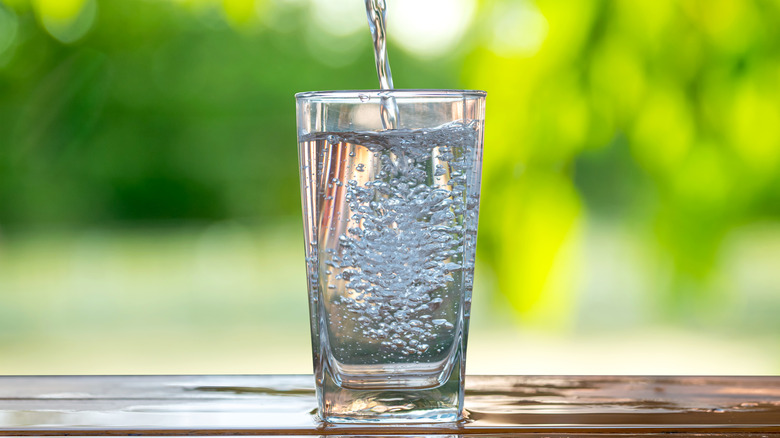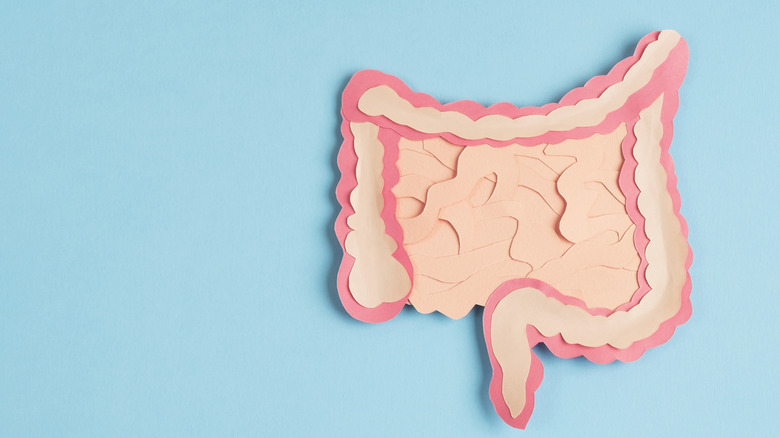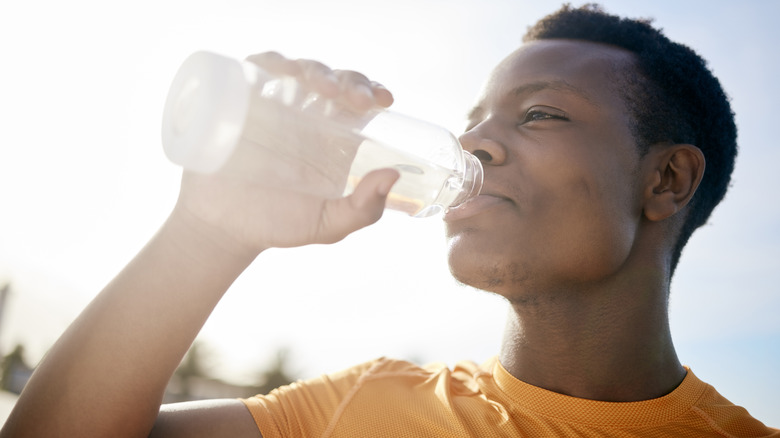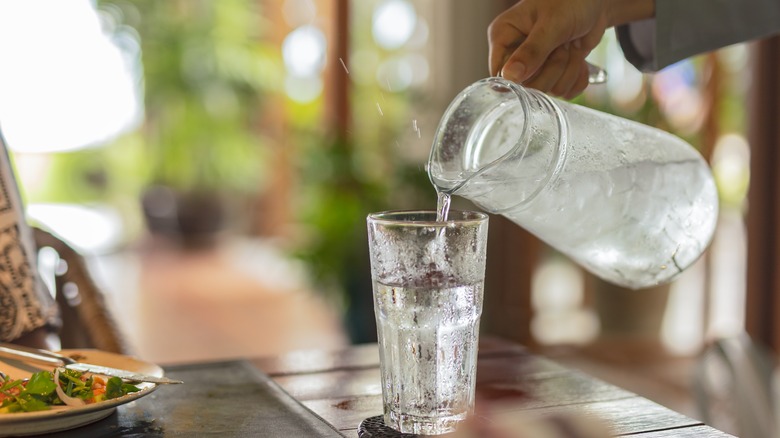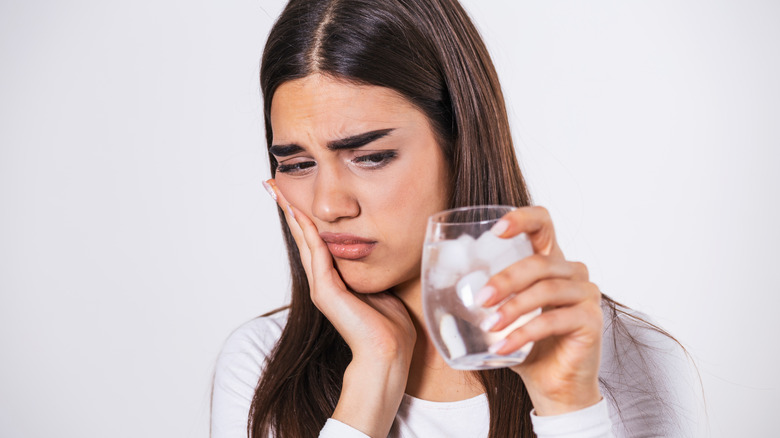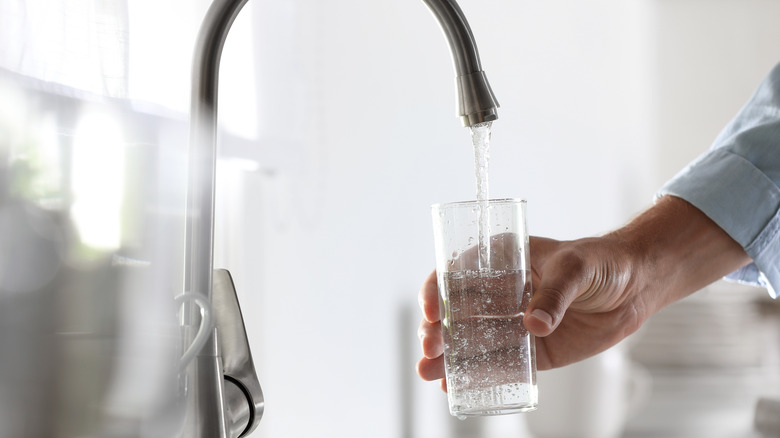13 Reasons You Should Consider Drinking Your Water Warm
We all need water to survive. On average, a human being can only live 3 days without drinking water (via Medical News Today). Water is essential to support many of our bodily functions — roughly 60% of the body's weight is water, after all. Your body uses water to lubricate your joints and tissues, support digestion and elimination, promote brain function, keep your heart healthy, and so much more (per Everyday Health). Throughout the day, basic activities like breathing, sweating, and going to the bathroom cause your body to lose water. It's your priority to make sure that water is replaced.
According to the Mayo Clinic, human males should consume about 15½ cups of water per day, and females should drink 11½ cups. In general, this looks like drinking about eight glasses of water every day. But are you sure you are drinking water at the right temperature? You may have heard that ingesting cold water is not good for you — and this claim might be more than just an old wives' tale. There are actually several different incentives for drinking your water warm — let's explore some of the reasons why you might want to hold the ice the next time you order a glass of water.
1. Cold water negatively impacts your digestion
Consuming cold water can be bad for your digestion in a variety of ways. First of all, the cold temperature of the water can constrict the blood vessels in your digestive system, meaning it will have to work harder to do its job, and digestion is hindered as a result. On top of that, your body already expends a lot of energy to digest food and assimilate nutrients. Consuming cold water requires your body to use some energy to regulate your body temperature and bring the water to said temperature so that it's able to be absorbed. Your body has a finite amount of energy — if it's working to process cold water, that energy is being diverted from somewhere else, like the digestive system (via Kent Health Care Products). This can slow down digestion, which can lead to a wide range of digestive issues.
Not only that, but there is growing research that suggests that drinking warm water aids digestion and elimination. Not only can warm water help dissolve food particles, but it can also ease digestive issues like constipation. You may especially want to avoid drinking cold water if you have a chronic health condition that affects your digestive system; a scientific study published in the Journal of Gastroenterology found that consuming cold water had a negative impact on those struggling with irritable bowel syndrome (IBS).
2. The temperature shift can shock your body
Drinking cold water can actually shock your body, especially if you are overheated from an intense workout or hot summer day. This may seem counterintuitive because when you're feeling hot and sweaty, your body tends to crave ice-cold water. But unfortunately, this may not be the best thing for you. The extreme temperature shift can shock your system and cause a stomachache.
According to Dr. William J. Bulsiewicz, a board-certified gastroenterologist, tells Livestrong, "It's possible that some people have sensitivity to temperature and can have stomach spasms as a result of cold water." While this can vary from person to person, Dr. Bulsiewicz recommends sticking to room-temperature water if you notice cold water hurts your stomach. Plus, gym pros agree that drinking warm water after a workout is easier on your body. If you try to drink cold water after a workout, the drastic difference in temperatures between your body and the water can inhibit your body's ability to absorb it (via NDTV Food).
3. Drinking water at room temperature hydrates you faster
In actuality, there is some evidence that suggests that drinking "cool tap water" or room-temperature water after a workout is best because it can help hydrate you faster compared to cold water. A study published in the International Journal of Clinical and Experimental Medicine found that, when you're dehydrated, drinking water that was around 60 degrees Fahrenheit was best for rehydration. Another scientific study written up in the Journal of Sports Science & Medicine confirmed that 60-degree water is optimal for dehydrated athletes exercising in a hot climate.
As mentioned, your body has a limited amount of energy reserves. When you drink cold water, your body has to get to work to warm it up to body temperature before it can assimilate it for use (via Little Things). Not only does this process use up valuable energy, but it also delays your body's rehydration. So, take after Goldilocks and make sure the water temperature is just right — not too cold or too hot. Drinking warm water above 100 degrees Fahrenheit has been found to make you crave less water, often resulting in dehydration, according to a study by the U.S. Army.
4. Cold water can slow your heartbeat
Drinking ice-cold water may have a negative impact on your heart rate. A study published in Clinical Autonomic Research links cold water consumption with a lowered heart rate, which can be especially concerning for individuals at risk for heart disease or heart attacks. Drinking cold water can slow your heart rate because it stimulates the vagus nerve — one of the main nerves in your parasympathetic nervous system. The vagus nerve maintains many essential bodily functions: not only your heart rate but also digestion, immunity, mood, and breathing (via Cleveland Clinic).
According to the Mayo Clinic, a slowed heart rate can inhibit your body's ability to get enough oxygen, and it's important for your brain and other organs in your body to receive adequate oxygen to work properly. Some signs of bradycardia, when your resting heart rate is below 60 beats per minute, include chest pain, cognitive issues like confusion or bad memory, feeling lightheaded or dizzy, fatigue, and difficulty breathing. Be sure to visit a medical professional if you are concerned you may have a slow heartbeat.
5. Cold water can affect how your body breaks down fat
Have you heard the ongoing debate about drinking water with meals? Some people think that it's bad for digestion, while others disagree. But according to the Mayo Clinic, drinking water during or after a meal can actually aid in digestion. Either way, you may want to skip sipping on ice water — especially while eating — because it may hinder your body's ability to break down fat. Some health experts believe that drinking cold water after a meal makes it harder for your body to process the fats inside the foods you eat. For optimal digestion after eating, wait about 30 minutes before drinking a glass of room-temperature water, nutritionist Dr. Anju Sood informs NDTV Food.
It's also a good idea to think about the amount of water you consume after a meal. Sure, drinking some water is good, but chugging an entire 32-ounce Hydro Flask may not be the answer. Health coach Robyn Youkilis, author of the book "Go With Your Gut," recommends drinking about 8 ounces of water during your meals, according to Prevention.
6. Drinking cold water impacts your respiratory system
Consuming cold water can actually cause respiratory issues like a sore throat and difficulty breathing, among other things. Cold water can constrict the airways, making it feel harder to breathe after you drink it. This sensation is usually temporary and should subside after one minute, according to Hunterdon Pulmonary & Sleep. If it doesn't, be sure to get help from a medical professional.
In addition, drinking cold water has been known to contribute to mucus production in the body, leading to congestion and a stuffy nose, which can increase your risk of developing respiratory infections (via NDTV Food). In fact, a clinical trial written up in the journal Chest found that consuming cold water resulted in a buildup of mucus in the respiratory tract, while hot water and chicken soup helped open the airways. If you have pre-existing respiratory conditions like asthma, or are recovering from the common cold or flu, cold water will likely make your symptoms worse, according to Healthline.
7. Cold water can cause migraines
Have you ever taken a big bite of gelato and then had brain freeze? Also sometimes called an ice cream headache, brain freeze occurs when you eat or drink something really cold, resulting in headache-like pain (via Cleveland Clinic). Brain freeze has also been associated with consuming other frozen things like icy beverages, slushies, ice cubes, or popsicles. The best treatment for brain freeze is to put down the culprit and sip on some warm or room-temperature liquids to help your mouth and body recalibrate.
While brain freeze is usually an acute phenomenon, guzzling down cold water can cause a headache or migraine that lasts for way longer. In fact, a scientific study published in the journal Cephalalgia found that people who typically suffer from migraines have a high chance of experiencing one after consuming cold water. Therefore, if you are prone to headaches or migraines, it's best to stick to drinking room-temperature or warm water.
8. Cold water is bad for your teeth
Just like cold water can constrict the blood vessels in your airways and digestive system, it can also shrink the vessels in your teeth and gums. This slows the blood circulation in your mouth and can ultimately affect the health of your teeth and gums. As a matter of fact, drinking cold water is one of the most common causes for tooth sensitivity and also weakens enamel, according to Smiles on Greatwood Dentistry. Weakened enamel leaves your teeth more susceptible to stains and damage (via Balboa Victory Dental).
When it comes to brushing your teeth, warm water is twice as helpful cleaning the teeth compared to cold water because it is more effective at dissolving plaque and pieces of food. Plus, warm water leaves your enamel intact. Most dentists agree — avoid drinking cold water at all costs for the sake of your oral health.
9. Cold water may increase your blood pressure
If you have hypertension, beware: Drinking cold water is bad for those with high blood pressure because it can make the condition worse. Indeed, a 2014 research study published in the journal Blood Pressure Monitoring discovered that the consumption of cold water caused elevated blood pressure in otherwise healthy young people. The study concluded that drinking ice-cold water is especially risky for those with hypertension.
According to the Centers for Disease Control and Prevention (CDC), it's normal for your blood pressure to change throughout the day depending on what you are doing. However, if your blood pressure is chronically high, you are usually diagnosed with hypertension. Certain health and lifestyle factors affect your risk for hypertension, like pregnancy, being overweight, inadequate exercise, and diabetes. High blood pressure can lead to more serious and life-threatening conditions, like a heart attack or stroke, so it is important to check in with your doctor to see which treatment options are best for you if you struggle with hypertension.
10. Drinking cold water makes you feel cold
It may seem obvious, but it's worth emphasizing — drinking cold water makes you feel cold. This is because consuming something that is cold directly lowers your body's core temperature, even if you only ingest a small amount, according to Science ABC. In other words, don't do it if you don't want a set of chattering teeth while you're trying to work or relax.
A research study published in the Journal of the American Geriatrics Society confirmed that ingesting cold water directly lowers your body temperature, and the time it takes your body to bounce back to its original temperature depends on your age. The older you are, the longer it takes to get back to your starting temperature. Plus, your body has to call upon precious energy reserves to bring your core body temperature back up — energy that it could be using elsewhere for other important body functions.
11. Drinking warm water can help menstrual pain
Another reason to swap drinking ice water for warm water is that it may help alleviate menstrual cycle issues. Just like using a heating pad externally can help ease period cramps and pain, drinking warm water can do the same thing, but internally. Warm water consumption promotes relaxation in the uterus, calming the muscle spasms of cramps and supporting healthy blood circulation, according to eMediHealth.
Not only that, but drinking warm water can help ease other issues associated with premenstrual syndrome (PMS), like bloating, headaches, fatigue, and constipation. Warm water consumption has even been found to reduce the amount of blood lost and the intensity of the pain. In addition, ingesting warm water during your cycle has been linked to supporting hormone balance in the body, which can help regulate your cycle or assist in getting things back on track if your period is irregular. When it's that time of the month, try drinking warm water with a squeeze of lemon or a hot cup of tea instead of ice water.
12. Drinking cold water won't provide any extra help for losing weight
A trendy weight loss fad is to drink cold water — and lots of it. The theory here is that cold water helps speed up your metabolism. But contrary to popular belief, drinking cold water alone isn't a significant source of weight loss. Indeed, your body will need to expend some calories when drinking cold water to get it your temperature up so you can absorb it — but it's not such a significant amount of calories that you'll notice a difference from warmer water in terms of your waist size (via Healthline).
In actuality, drinking any type of water is helpful for maintaining a healthy weight. A research study published in the Journal of Human Nutrition and Dietetics linked drinking water — at any temperature — with a lower-calorie diet. This is most likely due to the fact that a glass of water typically takes the place of a higher-calorie beverage like soda or juice. As a matter of fact, a meta-analysis of many studies written up in The American Journal of Clinical Nutrition shows there is a strong connection with weight loss and increased water intake. So, when it comes down to it, drinking water can help with weight loss — but it doesn't matter if the water temperature is hot, cold, or somewhere in between.
13. Drinking warm liquids instead of cold water might help you feel better
While drinking cold water is generally associated with constriction and stagnation, consuming warm liquids is quite the opposite. Drinking warm water has been thought to help support healthy circulation, promoting blood flow and muscle relaxation. It may even help with chronic pain reduction. Consuming hot water has also been known to help assist with detoxification, since it naturally raises your body's temperature and promotes sweating that helps eliminate toxins and cleanses the skin (via Medical News Today).
In addition, drinking warm beverages may help boost mental and emotional health. A scientific study published in the journal Psychopharmacology looked at the physiological effects of drinking hot water, tea, and coffee and found that a majority of participants experienced less stress and anxiety shortly after consumption. While the study notes the effects could be partially due to the caffeine content in some of the beverages, it also points out that the hot temperature of the drinks had a positive impact on mental health. "There's something very comforting about hot beverages. People like hot beverages for their souls, for their psyches," gastroenterologist Dr. Brian Weiner told the Cleveland Clinic.
